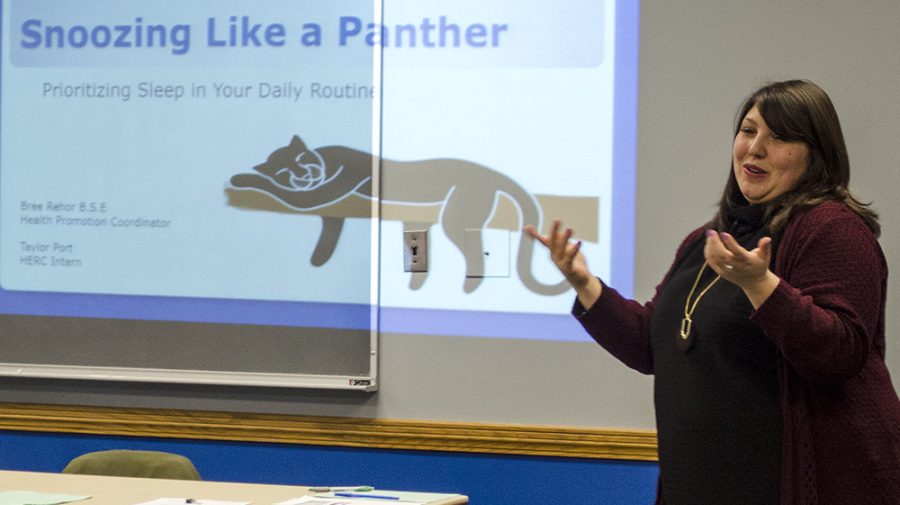Snoozin’ like a panther a success
Bree Rehar, health promotions coordinator at Health Education Resounce Center kicks off the “Snoozin’ Like a Panther” seminar in the Martinsville room in the Martin Luther King Jr. Union Monday. She educated students on how thier enviroment and health habbits can affect their sleep and then inturn their grades.
February 7, 2017
Nine out of ten college students report poor sleep quality, according the Health Education Resource Center.
At a presentation called “Snoozing like a Panther,” the center gave tips for students to get a better night’s rest and informed them of the benefits of sleep.
Bree Rehor, a health promotion coordinator at the HERC, said the more sleep students get, the better their academics will be.
Both of the presenters said students who lack sleep think they do better on tests than those who get enough sleep.
However, they tend to get lower grades than students with better sleep habits.
“People who sleep do much better on tests than those who stay up all night cramming,” Rehor said.
According to a study noted in the presentation, students who get A grades have 25 more minutes of sleep per night and go to sleep 40 minutes earlier than students who make B’s.
Taylor Port, an intern for the HERC, said lost sleep cannot be regained by sleeping longer or later.
“More total sleep, especially dream sleep, leads to better test scores and grades,” Port said.
Rehor said students who sleep regularly do much better on tests than those who stay up all night cramming.
Port and Rehor said students could get better rest by controlling their sleep environment.
They gave the audience an acrostic, “REDS,” to remember tips for better sleeping habits.
“R” stands for removing any electronics from the sleep environment.
“E” stands for establishing a relaxing bedtime ritual.
“D” reminds the audience not to use their bed for anything but sleeping and sex.
“S” tells the audience to only sleep when tired as opposed to when they are bored.
“Sometimes, it takes your body a week or so to feel good,” Rehor said when talking about how the body adjusts to a new sleep schedule.
Port and Rehor said exercise is not recommended within two hours of sleep. They recommended a light carbohydrate snack before bed, such as cereal or Goldfish snack crackers to help students fall asleep faster. Alcohol and smoking should be avoided within two hours before bed and caffeine should be avoided within six hours before bed.
Port said benefits of getting better sleep include less tension, less irritability and lower levels of depression.
Port and Rehor said waking up within the same hour every day and going to sleep within the same hour every night promotes consistent sleep habits.
They said being exposed to sunlight each morning helps to wake people up and feel more refreshed.
Another tip to better sleep given by Port was to keep naps short.
She said to keep naps at a 20 to 30-minute length maximum.
“Short naps are the most helpful to me. I am a firm believer in short naps … Short naps can improve your mood, alertness and performance,” Port said.
Port and Rehor said to avoid lengthy naps that put you into REM sleep. REM sleep, also known as dream sleep, is where people are in their deepest level of sleep cycle. Being in REM sleep and waking up without sleeping for the full eight hours leaves people waking up confused and feeling more tired than the 20 to 30 minute nap.
Port and Rehor said seven to nine hours of sleep for students is ideal, but eight hours of sleep nightly is required to feel great.
“Students that are mindful of their sleep and sleep environment are going to have a better experience at EIU, which will lead to success in their future endeavors,” Rehor said.
Liz Stephens can be reached at 581-2812 or [email protected].



















































